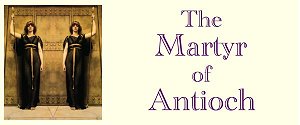| |
|
You are here: >
>
>
>
Preface
PREFACE
by
Arthur Sullivan
The words of The Martyr of Antioch are selected from the drama of that
name by the late Very Rev. H. H. Milman, Dean of St. Paul’s. The responsibility of the
selection, and the alteration in the manner of Margarita’s death, rests with the composer.
To his friend, Mr. W. S. Gilbert, is due the change which in one or two cases has been
necessary from blank verse to rhyme; and for these and many valuable suggestions,
he returns Mr. Gilbert his warm acknowledgements.
The action of the piece is laid at Antioch, in Syria, in the latter
part of the third century. The persons represented are:
| Heathens: | Olybius, the Roman Prefect (Tenor)
Callias, the Priest of Apollo (Baritone)
Julia (Contralto)
and other maidens and youths, worshippers of the Sun
|
| Christians: | Fabius, Bishop of Antioch (Bass)
Margarita, daughter of Callias (Soprano)
The Christian Congregation. |
The plot may be briefly described. Olybius is in love with Margarita, and she returned his love. This, however, was in her heathen days. She is now a Christian, and with her conversion, of which both her lover and her father are ignorant, she, although still not
indifferent to him, rejects all idea of union with a heathen. The piece opens with a chorus of sun-worshippers, preliminary to a solemn sacrifice. The Prefect calls for Margarita to take her accustomed place, and lead the worship. During her non-appearance the Priest charges him with lukewarmness in the cause of Apollo, and he avows his firm intention to put all Christians to death.
The scene changes to the Christian cemetery, where one of the brethren is buried, and a hymn is sung over him. After the funeral, Margarita remains behind and pours forth her feelings in adoration of the Saviour. Her father finds her thus employed, and learns for the
first time of her conversion.
The scene again changes to the palace of the Prefect. The maidens of Apollo sing their evening song. Olybius and Margarita are left together; he begins his old endearments, and dilates on the glories which will be hers when they are united. She then confesses that she is a Christian; he curses her religion, and she leaves him for prison.
The final action takes place outside the prison of the Christians, on the road to the Temple of Apollo. The maidens of Daphne chant the glories of the god, while from within the prison are heard the more solemn and determined strains of the Christians. Margarita is
brought forward and required to make her choice. She proclaims her faith in Christ. Her lover and her father urge her to retract, but in vain; and she dies with the words of rapture on her lips:
The Christ, the Christ, commands me to his home;
Jesus, Redeemer, Lord, I come! I come! I come!
I have the full sanction of the Dean’s sons for the use I have made of his drama; they permit me to say that, in their opinion, the alterations inevitable upon the adaptation of the drama to musical requirements have been made with judgement and good taste, and in
complete accordance with the spirit of the original work.
A. S.
|
|
|
Page created 12 November 2003
| |

